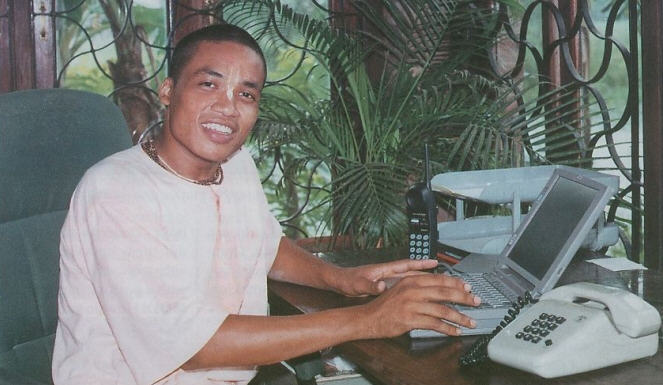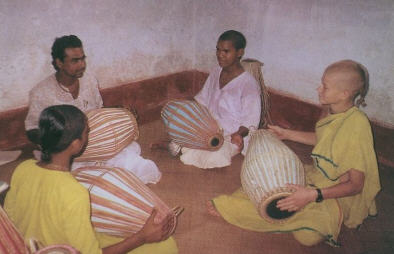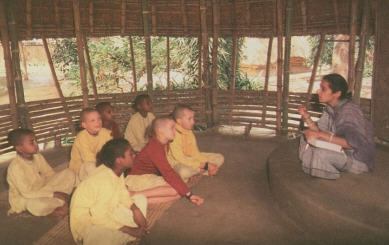
Vedasara Dasa
In a traditional village environment, students prepare for a Krsna conscious life in the modern world.
SRILA PRABHUPADA would often speak of ISKCON as an educational institution, and education will be an essential function of the Sri Mayapur Project. A beginning for developing education in Mayapur has been in place for some time in the form of the Bhaktivedanta Gurukula, a boys boarding school. In line with the traditional Vedic model, the Bhaktivedanta Gurukula gives boys both spiritual and occupational training. Mahamaya Devi Dasi spoke with Vedasara Dasa, the school's principal, about the school today and its plans for the future.
Mahamaya Devi Dasi: Can you say something about the history of the gurukula?
Vedasara Dasa: Srila Prabhupada started the Bhaktivedanta Gurukula here in 1974. He brought a few Nepali brahmanas to teach a dozen or so students. At that time the gurukula was located in what is now Srila Prabhupada's bhajana kutir.* Since then four schools have developed on the Mayapur property. Three are day schools. Our school, which is a boys' boarding school, is called the Bhaktivedanta Gurukula Village (BGV). It's next to the goshala [fields and barns where cows are tended].
MDD: What is your service in the gurukula?
VD: I have been the BGV principal for the last two years. Most of my life was spent in the gurukula. I was a student for twelve years, after which I became an ashram teacher and eventually the ashram coordinator.
MDD: How many boys are in the school now?
VD: We have thirty-five students, ages eight to eighteen, out of which twenty-six are teenagers. Half of the students are from India, half from abroad.
MDD: What subjects are taught?

VD: Because it's a boarding school, we teach academic subjects and, in the ashram, a give devotional training. The ashram subjects are Temple Mantras, Vedic Mantras, Deity Worship, Philosophical Debate, Vaisnava Etiquette, Bhakti Sastri [scripture study], Bhagavad-gita Verses, and Canakya Nitisastra [moral instructions of the sage Canakya]. We have four ashram teachers.
The academic subjects are English, French, Spanish, Italian, Sanskrit, Bengali, Arts, Science, Geography, Mathematics, World History, and World Religions. We have seven academic teachers.
We also teach vocational subjects: Cooking, Carpentry, Tailoring, Computer, Mrdanga [drum], Electricity, Harmonium, and Deity Dressmaking. We have eight vocational teachers.
MDD: What are the boys' days like?
VD: They get up at 3:30 in the morning to begin their spiritual program. They have academic classes during the day, and extracurricular activities from 4:00 to 5:30. We have full-size basketball and volleyball courts, a soccer field, a simple exercise room, and a swimming pond. The boys regularly go to the Ganges. I think it's important that teenage boys engage in sports to release their excess energy in a healthy way.
MDD: What are the school's plans for the future?
VD: We want to be better equipped to help the older teenage boys find an identity.
MDD: How do parents feel about enrolling their sons in the school?
VD: We have a waiting list of about thirty Western boys and fifty Indian boys. Their parents are eager to admit them into the school. Most parents who visit the school come away with a positive impression.
MDD: How do you view Srila Prabhupada's instructions on gurukula?
VD: Srila Prabhupada wanted us to produce high-quality devotees with excellent character and also basic academic qualifications. I think Srila Prabhupada's instructions will be most effective when the entire ISKCON social infrastructure is stable and healthy. To fulfill Srila Prabhupada's vision for a class of high-quality devotees, we must bring up our children in an emotionally and spiritually stable family environment.
MDD: Are you committed to this project?
VD: Yes, I would certainly like to spend a good part of my life in education, building up a nice gurukula for the upcoming generation. My special interest is in working with older teenage boys and helping them to get situated after graduation. Dedicated and mature devotees are getting involved and showing commitment to the project. One thing that keeps me going is the heartfelt appreciation of both parents and kids. I want to give the next generation a positive Krsna conscious experience.
MDD: What is the involvement of the parents of the boys? Do you have a parent/teacher association?

VD: Because we're an international school with parents scattered far and wide, a PTA per se is not practical. But we keep in close contact with the parents. We strongly encourage all parents and children to keep in regular touch. Parents are advised to write at least every two weeks and telephone once a month. Several parents are working with the school as teachers or administrators.
MDD: Tell me about the older boys and their program taking the GCSE, their vocational training, and so on.
VD: Senior students study for their British GCSE (General Certificate of Secondary Education). The students take the exams in Calcutta at the British consulate, and the exams are sent to England for marking. The students receive the same diploma from the University of London as any student in Britain. This is an internationally recognized high school diploma. One of our recent graduates, Narayana Dasa, went straight into an American university.
In addition, the seniors take the Bhakti Sastri exam, a six-hour examination on four of Srila Prabhupada's books. Eight boys recently took this exam; four passed with honors, and the other four with high honors.
We try our best to equip the students for life after the gurukula by training them according to their propensities. With their learned skill, trade, or profession, they can offer service to ISKCON or support themselves and their future families.
Vocational training comes in three stages. In the first stage, the boys spend about two years experimenting with the options available. When they have settled on their chosen skill, they receive another two years of more serious training in that area. Stage three is an apprenticeship with a senior skilled devotee. For example, a recent Indian graduate, Gautama Dasa, is in a two-year apprenticeship course with Dina Caitanya Dasa, a Swiss devotee, learning all about construction management.
These three divisions are an integral part of the BGV's efforts to meet the individual needs of the boys.
Twenty-two-year-old Vedasara Dasa was born in Bhutan (near China), and raised in Assam. He joined the Bhaktivedanta Swami Gurukula at age six and has been there ever since.
